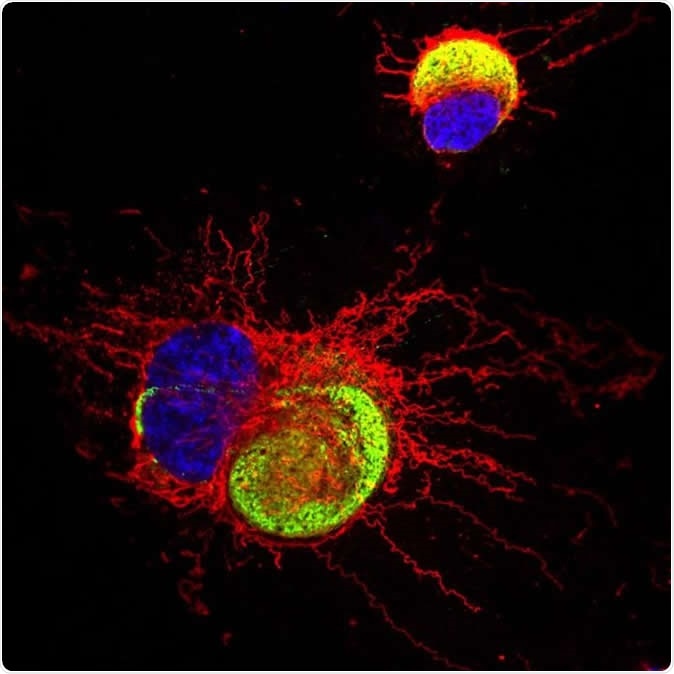The Zika virus (ZIKV) outbreak in Brazil in 2015 sparked for many health agencies and scientists to study the pathogen, which has been linked to microcephaly and other fetal neurological disorders collectively known as Congenital Zika Syndrome.
Now, a team of researchers at the D’Or Institute for Research and Education (IDOR) sought to reveal the virus reactions on laboratory-created astrocytes, which are among the first cells to respond to ZIKV infection in the brain and are targets for viral infections.

The Zika virus is highlighted in green, as the astrocyte nucleus is in blue and its cytoplasm in red. Image Credit: Karina Karmirian and Pítia Ledur
hough previous studies have been made about the damage of the Zika virus on the brain, particularly astrocytes, only a few ones proposed to determine the effects of the infection on the cells. Further, there aren’t many studies that explained the link of the virus to developmental problems such as microcephaly and brain malformations among babies born to mothers infected with the virus.
The new study, published in the journal Scientific Reports, shows how the virus damages laboratory-created astrocytes and comparing them to the same cells present in the brain tissue of animals and fetuses infected with the virus.
Astrocytes are the most numerous cell type in the central nervous system (CNS), which can be likened to stars, form a neural constellation. They are vital for many cognitive functions, such as forming synapses, forming the blood-brain barrier, and providing metabolic support for neuron cells. They also perform several tasks like axon guidance, control of the blood-brain barrier, blood flow regulation, and synaptic support.
Damage on astrocytes
The new study carried out by researchers from IDOR in collaboration with the Federal University of Rio de Janeiro (UFRJ), and other Brazilian institutions, revealed that due to damage on astrocytes, the disease manifests neural complications, contributing to brain malformations in infants born to Zika-stricken mothers.
The authors said that based on evidence and scientific literature, Zika targets astrocytes but until now, there is no study showing how it affects the cell’s functioning. The major damages the virus imposes on astrocytes include oxidative stress, DNA breakage, and overload of its mitochondria. Among these damages, oxidative stress has been linked to cancer, premature aging, and neurodegenerative conditions.
New insight on Zika virus effects on astrocytes
In the new study, the researchers studied three types of brain cells and found that among the cells, the Zika virus has more severe damages to astrocytes. During infection, the mitochondria in the astrocytes, which is the powerhouse of the cell and responsible for cellular respiration, changes and starts to produce free radicals, triggering oxidative stress. As a result, astrocytes die and those who survive have irregular cell nuclei with reduced sizes.
Further, the researchers said that the damage to astrocytes may be irreversible. One of the damages noted is the damage or breakage of the DNA, and to repair this, the cell can undergo two types of repair – a homologous recombination, wherein it uses an entire copy of DNA as a pattern and the non-homologous recombination, which is faster but can be prone to mutation. In non-homologous cell repair, it dispenses the presence of an integrated DNA copy. Neural stem cells, which are proliferating cells utilize both repair methods. But, when these cells are differentiated, just in the case of Zika-infected cells, the astrocytes have a lower chance of homologous recombination, boosting the likelihood of permanent mutations.
Greater signs of inflammation in fetal astrocytes
The researchers also studied materials about brain tissues of fetuses that didn’t survive the infection. They found that in fetal astrocytes, there are marked signs of inflammation, showing that these cells are the major targets of the virus. Also, the same inflammation was noted in animal studies. In laboratory mice, the astrocytes showed more vulnerability to the infection, compared to other cells.
The researchers concluded that due to the vulnerability of the astrocytes to the Zika virus, and their role in many brain functions, an infection may lead to brain malformations, which can be chronic, permanent, and lifelong. The brain malformations and conditions usually seen in infants born to Zika-infected mothers include microcephaly, and possibly, other neurological problems that could manifest in later life of those infected while in the womb.
Journal reference:
Ledur, P.F., Karmirian, K., Pedrosa, C.d.S.G. et al. Zika virus infection leads to mitochondrial failure, oxidative stress and DNA damage in human iPSC-derived astrocytes. Sci Rep 10, 1218 (2020). https://doi.org/10.1038/s41598-020-57914-x